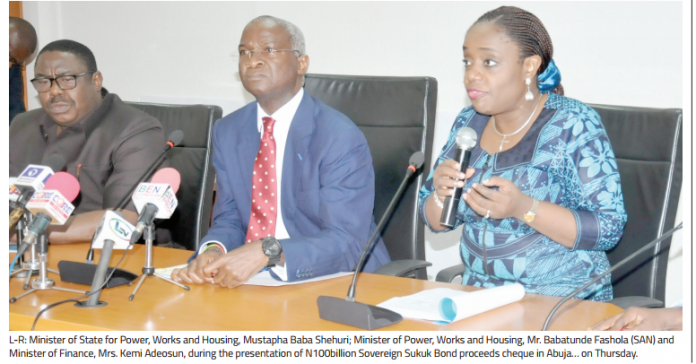The Federal Government has released the proceeds of the N100billion Sukuk bond to 25 key economic road projects of the Federal Ministry of Power, Works and Housing across the country.
The Minister of Finance, Mrs. Kemi Adeosun, on Thursday, in Abuja, handed over the N100bn proceeds cheque to the Minister of Power, Works and Housing, Mr. Babatunde Fashola (SAN).
Fashola will release the funds to the contractors handling the projects across the six geo-political zones in the country. The Federal Government had issued the debut Sovereign Sukuk of N100bn in September 2017, which was successfully completed last week.
The Sukuk bond has a tenor of seven years. Adeosun, who disclosed that the offer was oversubscribed to the tune of N105.87billion, said the milestone was a sign of confidence on the Nigerian economy and the administration of President Muhammadu Buhari.
She added that the Sukuk proceeds would unlock the potentials of Nigeria. She said, “This is the first Sukuk bond issuance for Nigeria.
It is about financial inclusion and deepening of our financial markets. “The proceeds will be used to further support government capital spending for 2017 – the construction and rehabilitation of 25 key economic roads across the six geo-political zones of the country.
“The roads will ease commuting, spur economic activities across the country and further close our infrastructural gap.” Each of the geo-political zones of the country is expected to receive the sum of N16.67bn for road projects in their respective zones.
The North Central and South-South zones accounted for five each of the 25 key economic road projects, while the North East, North West and South East have four road projects each.
Three projects are to receive funding from the Sovereign Sukuk proceeds in the South West zone. Fashola had earlier commended Adeosun, the Director-General of Debt Management Office, Ms. Patience Oniha and the financial advisers for the bond issuance for their painstaking efforts realising the milestone.
Fashola assured the ministry’s contractors that the Federal Government was committed to the funding of its infrastructural projects across the country.
The representative of the contractors, Mousa Nahkia, expressed the contractors’ gratitude to President Muhammadu Buhari and ministers, Adeosun and Fashola, for “working day and night to make this a reality.”
Nahkia, who is the Managing Director of RCC Construction Company, further said, “Nobody can hide our smiles today, we believe in this country; and its economy.
This is really a great development and accomplishment. We really want to thank President Muhammadu Buhari, the Minister of Finance, Mrs. Kemi Adeosun and the Minister of Power, Works and Housing, Mr. Babatunde Fashola, for increasing our confidence in this country and the Federal Government,” A breakdown of the allocation of the Sukuk Bond proceeds for roads projects in the six geo-political zones is as follows: North Central’s five roads gets N16.67billion; North East’s four roads gets N16.67billion; North West’s four roads N16.67billion; South East’s four roads – N16.67billion; South South’s five- N16.67billion and South West’s three roads -N16.67billion; bringing the total amount that would be spent to N100bn.
The key economic roads in the each geo-political zones are: for the North Central (Construction of Loto -Oweto bridge, dualisation of Abuja Lokoja Road sections 1 and 4, dualisation of Suleija – Minna Road phase 2, dualisation of Lokoja Benin Road section 1).
North East (dualisation of Kano- Maiduguri Road section 2, 3,4 and 5) while the North West are dualisation of Kano-Maiduguri Road section 1, dualisation of Kano-Katsina Road phase 1, construction of Kano Western By-pass and construction of Kaduna Eastern By-pass. For the South East: rehabilitation of Onitsha-Enugu Express Way, rehabilitation of Enugu- Port Harcourt Road sections 1, 2 and 3. South-South: rehabilitation of Enugu – Port Harcourt Road section 4, dualisation of Yenagoa Road Junction to Kolo, Otuoke to Bayelsa Palm and dualisation of Lokoja-Benin Road sections 2, 3 and 4. In the South West: reconstruction of Benin-Ore, Shagamu-Adebandele dual carriage way phase 3 and 4, and dualisation of Igbado-Ilorin section 2.
In a related development, the Senate, on Thursday, appealed to President Muhammadu Buhari to ensure good implementation of the 2017 Budget, warning that failure to do that may cause the 2018 Budget to get over bloated.
On this, the Senate President, Bukola Saraki, warned that improper implementation of the 2017 Budget will ultimately jerk up the 2018 budget to over N10trillion. Saraki expressed concern that in the event of failure by the executive arm to implement the 2017 budget by more than 50 percent, the 2018 budget might be more than N10trillion.
Finance Minister, Mrs. Kemi Adeosun, had hinted that 60 percent of the votes in the 2017 Budget may be rolled over to 2018 against the background of shortage of funds, which had stifled the smooth implementation of the budget of the current year.
Saraki said: “The executive must carry out the implementation of the budget in line with what is passed. They should not go about selective implementation of the budget.
If they want to borrow, they should not hesitate to send their requests. He added: “If the implementation of the 2017 budget will not be up to 50 per cent, it means we should expect to have a budget of N10 trillion in 2018.
I hope the executive takes note of that.” The Senate President, however, presented the resolve by the Executive arm to vire the sum N135 billion from the 2017 budget for execution of some projects tagged as priority as he appealed to Senators not to reject the request by the executive.
Many senators had kicked against the request for virement of the N135billion by the government of President Buhari, anchoring their reasons on poor implementation of the 2017 Budget.
Saraki had to plead with his colleagues before the senators eventually agreed to approve the request, as the Senate referred it to the Committee on Appropriation for consideration.
Notwithstanding, Saraki acknowledged the arguments canvassed by senators who opposed the bid for virement by the executive, insisting that certain level of commitment in budget implementation must first be shown before a request for virement.
Saraki said: “Before virement could be considered, Senate should have seen a more significant level of implementation, but this is in line with Senate’s commitment to give support to the executive as much as possible within the law”.
In the same vein, Saraki differed with Adeosun who earlier told Senators that the poor implementation of the 2017 Budget was partly caused by the delay in getting requests for foreign loans approved by the National Assembly.
Saraki said the statement by Adeosun was not true as all requests from Buhari were approved before the National Assembly embarked on its annual recess in July, 2017. The Senate President said, “There is no request before us about borrowing that we have not approved.
We approved all the requests before we went on break. I needed to make this explanation because of what the Minister of Finance said that the National Assembly is holding on to borrowing requests sent by the executive.”




